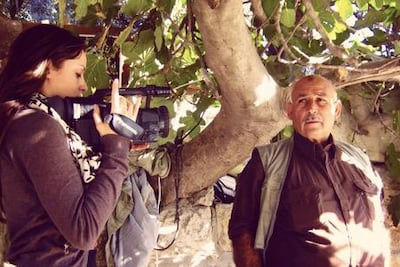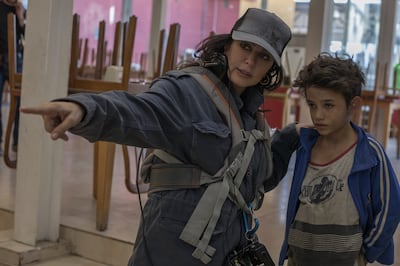Arab cinema is experiencing more attention and praise than ever before, and leading the way are some of the most talented female filmmakers from the region.
Over the years, Arab women have earned nominations in categories including Best Live Action Short Film and Best International Feature film.
Ahead of the 2024 Academy Awards, we chart all the Arab directors who’ve had films nominated for an Oscar.
Lexi Alexander

Born in Germany to a Palestinian father and German mother, Alexander’s first and only nomination came in 2003 for her short film Johnny Flynton.
Her film didn’t win the award, but the nomination paved the way for her to direct some memorable action films.
In 2005 she directed Green Street, a film about English football fanatics and their tribal wars with rival fans. Three years later, she directed Punisher: War Zone, a comic book adaptation of the cult favourite comic book character.
Alexander is also a former world kick-boxing champion and close-quarter-combat instructor for the US Marines.
Jehane Noujaim

The daughter of a Lebanese father and American mother was nominated for the documentary The Square in 2014. The film chronicles the events that took place in Cairo’s Tahrir Square after 2011’s Egyptian Revolution.
Noujaim directed three documentaries before her success with The Square and has since directed The Great Hack in 2019 about the Cambridge-Analytica data scandal.
She has also ventured into television, directing an episode of the hit show Ramy as well as episodes of the HBO documentary series The Vow.
Sara Ishaq

The Yemeni-Scottish director’s film Karama Has No Walls was nominated for Best Documentary Short in 2014. It focuses on the start of the 2011 Yemeni Revolution.
The director made herself the subject of her next documentary, The Mulberry House, as she recorded her experience of returning to her childhood home in Yemen.
Ishaq has also taken part in humanitarian projects, including teaching rehabilitative yoga classes at the Nablus Women's Centre while volunteering with Project Hope (Palestine).
Waad Al-Kateab

Syrian journalist and filmmaker Waad Al-Kateab began her career during the civil war in her country. She would broadcast and cover events in Aleppo, a city ravaged with fighting.
Her film For Sama, co-directed with Edward Watts, tells the story of how Al-Kateab and her husband Hamza struggle with the conflict as they raise their daughter Sama.
The film earned a nomination for Best Documentary Feature at the 2020 Academy Awards. For Sama lost out to American Factory but earned huge praise for being a raw experience of the horrors of war from the eyes of a woman.
Al-Kateab was also included in Time magazine's 100 Most Influential People in 2020.
Meryam Joobeur

The Tunisian-Canadian director's film, Brotherhood, was nominated for Best Live Action Short Film in 2020. It follows the story of a father coming to grips with the return of his estranged son who has brought home a new wife.
Joobeur's new film, Who Do I Belong To, recently screened at the Berlin International Film Festival and is due to be released later this year.
It is a drama about a young man who returns home to his village and unleashes an evil upon its inhabitants.
Kaouther Ben Hania

The Tunisian director made history by becoming the first Arab woman to be nominated twice, the first time for her film The Man Who Sold His Skin in 2021.
Her new film Four Daughters is nominated for Best Documentary Feature at this year’s Academy Awards. It tells the story of a Tunisian mother whose two daughters escape to join an extremist group in Libya. The film has already won for Best Documentary at Cesar Awards and the Independent Spirit Awards, making it a strong contender for the golden statuette.
Ben Hania has been directing since 2004, starting with short films and moving into features by 2010.
Speaking to The National at last year's Cannes Film Festival premiere of Four Daughters, she said: “After the [Oscar] nomination I had a lot of offers to direct English-speaking films … Not a Marvel movie, but a lot of things”.
Nadine Labaki

The Lebanese actress and filmmaker made her directorial debut in 2007 with Caramel. She followed that up with the popular Where Do We Go Now? In 2011.
However, it was her film Capernaum that earned her global acclaim, culminating in a nomination for Best Foreign Language Film in 2019.
Capernaum looked to have a real chance of winning, but eventually lost out to Alfonso Cuaron’s Roma, which also went on to win Best Picture.
Farah Nabulsi

The British-Palestinian filmmaker worked as a stockbroker before changing her career path to pursue directing.
Her film, The Present, was nominated for Best Live Action Short Film at the 2021 Academy Awards. It tells the story of a man and his daughter who navigate the hostile environment of the West Bank as he sets out to buy his wife an anniversary present.
Last year, Nabulsi directed a feature, titled The Teacher, which screened at the 2023 Toronto Film Festival as well as the Red Sea International Film Festival.


